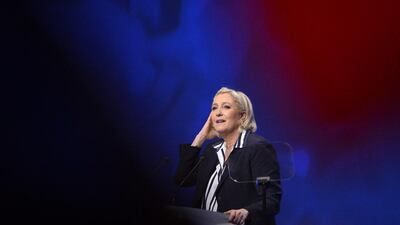"Today, what is at stake is our national unity, the values of the republic. It is the idea we have of France, of its role and its place in Europe and the world.” With these words, the front-runner in the French presidential election urged his fellow citizens not to vote for the Front National. The country must come together, he said, and keep the party and its demagogic leader Le Pen, out of power.
The person who spoke those words was not Emmanuel Macron in 2017, but Jacques Chirac in 2002. And he wasn’t talking about Marine Le Pen; he was talking about her unreconstructed father, Jean-Marie, who won nearly 18 per cent of the vote in 2002 to make it through to the second round.
Fifteen years later, a bungled war in Iraq and a war on terror, a global financial crash and Europe’s worse migration crisis for decades, and Mr Le Pen’s daughter has gone through to the second round with 21.4 per cent – a small increase, perhaps, but one that broke through 20 per cent, a crucial psychological barrier in French psephology.
The electoral map tells the story: in 2002, Mr Le Pen took departments – the French voting divisions – in the south-east and along a contiguous range through the east and the north-east.
Ms Le Pen kept those, but expanded her support across the north and into the centre. A few percentage points masks much greater political influence.
The blame for that must be placed squarely where it belongs: on the political establishment of France.
In 2002, after years of neglect of those areas that turned to the Front National, the establishment was given a bloody nose by the electors. The response was to hold the voters to ransom: you have created this monster, they said in effect, now you must band together and keep him out by re-electing Mr Chirac.
And here we are again, a decade and a half later. Once again, the French political bubble has failed to speak to millions of French citizens. They have turned to the only voices they believe speak for them: millions voted for the far-right in Ms Le Pen and millions more (nearly 20 per cent) for the far-left Jean-Luc Melenchon.
The reaction has been predictable: France itself is in danger and the voters must swallow their political convictions to keep the racist wolf from their door.
The people must save democracy – otherwise, the unspoken threat runs, you will be responsible for what happens. That the French political establishment, after years of not offering viable solutions for many millions, were the very people who damaged democracy is never mentioned.
If Mr Macron were to win next week – and given the uncertainty of this era of democratic politics, it is certainly not a sure thing – be under no illusions that it will be business as usual. The issues that contributed to the rise of the far-right will be forgotten until the next time.
This is precisely what would have happened had the two big political shocks of last year not happened.
Does anyone seriously think that Hillary Clinton would have turned around after her victory and focused on the issues that mattered to Donald Trump’s white working-class supporters? Or that David Cameron, having won the EU referendum and stayed in the European Union, would have looked at the impact of immigration outside of the big cities?
The issues that motivate Ms Le Pen’s supporters, like those that motivated Mr Trump’s and Brexit voters, are real. The economy is not working for too many: young people are unable to start their careers and their families and working people in many areas are struggling to scrape a living. Immigration strategy is lopsided, putting new arrivals into areas where they are least able to contribute. Remote groups, financial companies and government and European bureaucrats, have too much power.
Many of Ms Le Pen’s supporters are not racist – and I say this as someone who was part of the protests in Paris against her father in 2002. Even then it was clear that, while the young people who took to the streets detested his party, they bore no real love for the politicians they were, in effect, supporting.
There was then a profound anger with the political establishments of western democracies. After the Iraq war and the financial crash, that anger has only increased, and the inequalities in every western society have become greater.
Political and economic forces have pushed voters in the centre ground towards far-right fanaticism and left-wing idealism. Until centrist forces can find a way to speak to these voters, movements that dislike the establishment will continue to bubble up. The anger is real; it is merely shifting form and expression.
On Sunday, France will elect a new president. Whoever wins will make history, either as the first female president or as France’s youngest. But there will be millions who will go to the polls on that day and hold their noses, either because they hate the far-right more than the establishment, or because they hate the establishment more than the far-right.
And who can blame them? There will be many who will give in to the desire to burn the system and see what happens – because they believe the world around them is all ashes anyway.
falyafai@thenational.ae
On Twitter: @FaisalAlYafai


